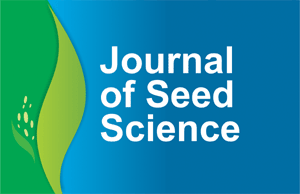The objectives of this study were to evaluate the efficiency of fungicides for pea seed treatment against damping-off caused by Rhizoctonia solani and to verify their effects on physiological seed quality. 'Mikado' pea seeds were treated with the following fungicides: Carbendazim, Carbendazim + Thiram, Captan, Iprodione, Iprodione + Thiram, Metalaxyl-M + Fludioxonil, Pencycuron, Procymidone and Tolyfluanid. Control seeds were treated with deionized water. Physiological seed quality was evaluated with the following tests: germination, first count, accelerated aging and electrical conductivity. Seeds were sown in soil inoculated and no inoculated with R. solani. The experimental design was completely random with four replications. Seedling emergence was reduced in inoculated soil and the best treatments for R. solani control were Carbendazim, Pencycuron, Iprodione and Carbendazim + Thiram. Captan reduced seed physiological quality in both the laboratory and field.
Pisum sativum; germination; stand establishment; fungicides; pathogens
